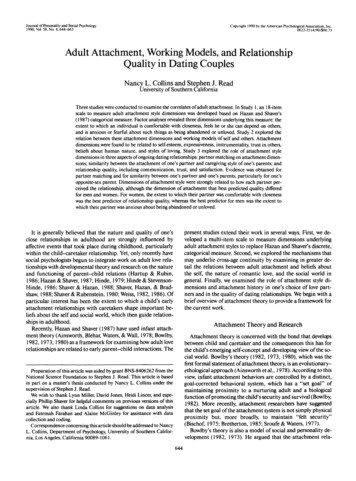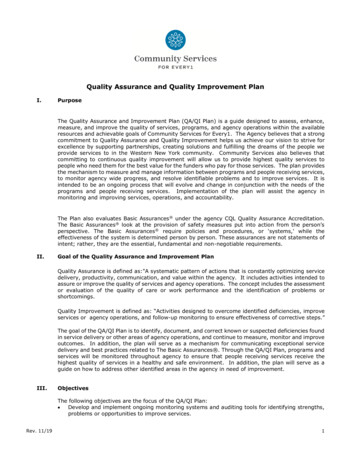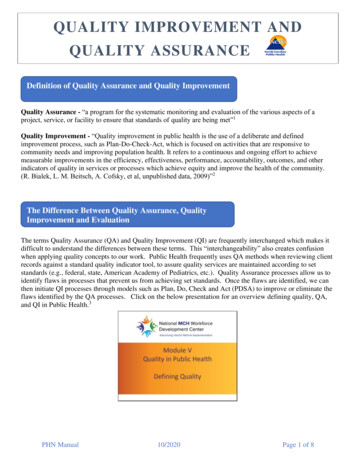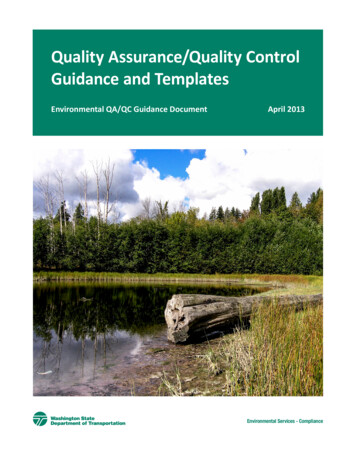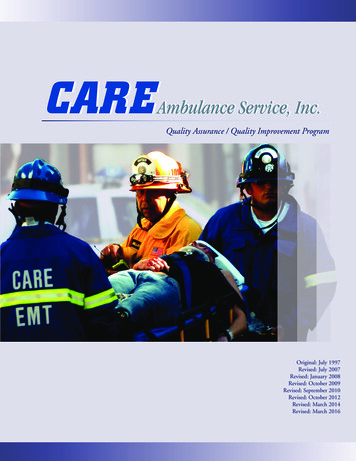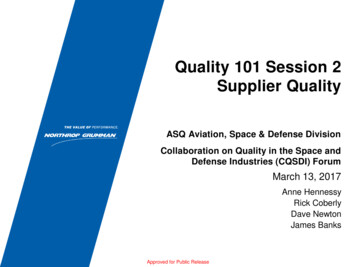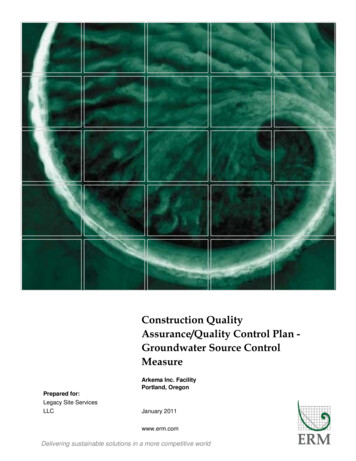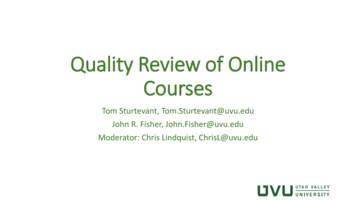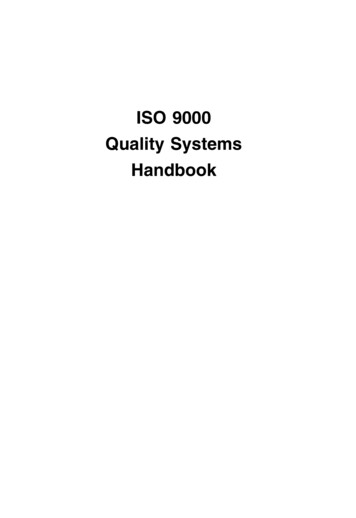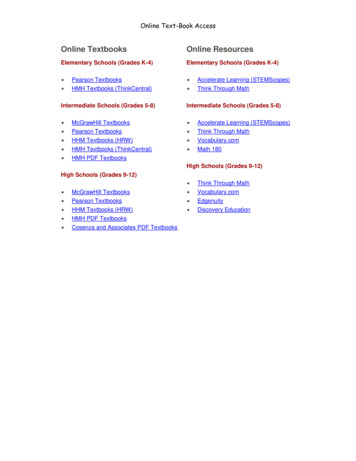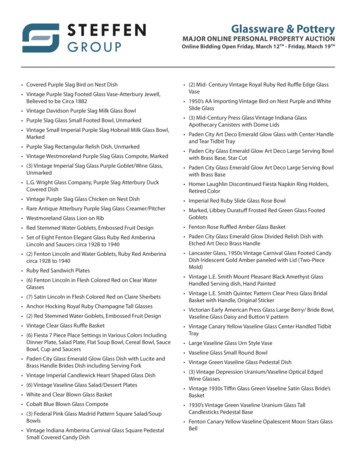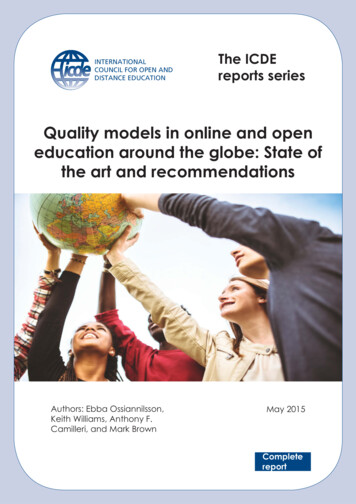
Transcription
INTERNATIONALCOUNCIL FOR OPEN ANDDISTANCE EDUCATIONThe ICDEreports seriesQuality models in online and openeducation around the globe: State ofthe art and recommendationsAuthors: Ebba Ossiannilsson,Keith Williams, Anthony F.Camilleri, and Mark BrownMay 2015Completereport
Published by and with the support of:International Council for Open and Distance Education – ICDELilleakerveien 23, 0283 Oslo, Norwayicde@icde.orgwww.icde.orgComplete report, Executive summary and Appendices: http://icde.typepad.com/quality models/ISBN:Print: 978-82-93172-33-8PDF: 978-82-93172-34-5This work is published under a Creative Commons Attribution-ShareAlike 4.0 Internationallicence (CC BY-SA 4.0).This licence is acceptable for Free Cultural Works.You are free to: Share — copy and redistribute the material in any medium or formatAdapt — remix, transform, and build upon the materialfor any purpose, even commercially.The licensor cannot revoke these freedoms as long as you follow the licence terms.Under the following terms: Attribution — You must give appropriate credit, provide a link to the licence, and indicate ifchanges were made. You may do so in any reasonable manner, but not in any way thatsuggests the licensor endorses you or your use.ShareAlike — If you remix, transform, or build upon the material, you must distribute yourcontributions under the same licence as the original.No additional restrictions — You may not apply legal terms or technological measures thatlegally restrict others from doing anything the licence permits.Notices: You do not have to comply with the licence for elements of the material in the public domain orwhere your use is permitted by an applicable exception or limitation.No warranties are given. The licence may not give you all of the permissions necessary for yourintended use. For example, other rights such as publicity, privacy, or moral rights may limit howyou use the material.The full text of the licence may be consulted at: https://creativecommons.org/licences/by-sa/4.0This report should be cited as:Ossiannilsson E, Williams K, Camilleri A & Brown M (2015) Quality models in online and open educationaround the globe. State of the art and recommendations. Oslo: International Council for Open andDistance Education (ICDE).
INTERNATIONALCOUNCIL FOR OPEN ANDDISTANCE EDUCATIONQuality models in online and openeducation around the globe: State ofthe art and recommendationsTable of ContentsPreface . 3Acknowledgements . 5Executive Summary . 6Goals and Project Outcomes . 6Lessons Learned . 7Recommendations to Stakeholders . 101 Setting the Scene . 121.1 Rationale for the Study . 121.1.1 Impact of the study . 121.1.2 Project approach . 121.1.3 Governance of the project and its organisation . 131.1.4 Structure of the report . 131.2 Context . 131.3 Global Challenges in Open Online Education . 162 Research methodology . 193 Results and Findings. 203.1 Literature Survey . 203.2 Quality Concepts . 233.3 Quality Spectrum . 233.3.1 Quality on macro, meso and micro levels . 243.3.2 Interpretations of quality concepts . 243.3.3 Accreditation-based systems . 253.3.4 Norm-based systems . 253.3.5 Maintenance of standards . 263.3.6 Quality assurance-based. 263.3.7 Mature enhancement based systems . 273.4 Quality Standard Models . 273.5 Quality Matrix . 293.6 Characteristics of Quality Systems . 303.7 Nature of Quality Interventions . 323.8 Stakeholder Perspectives . 32Complete report, May 2015Page 1 of 52
INTERNATIONALCOUNCIL FOR OPEN ANDDISTANCE EDUCATIONQuality models in online and openeducation around the globe: State ofthe art and recommendations3.8.1 Perspectives of institutional stakeholder groups . 333.8.2 Work of specific international stakeholders. 343.8.3 National approaches to quality . 353.8.4 International coordination of quality systems . 354 Discussion and Conclusions . 375 Recommendations . 43Complete report, May 2015Page 2 of 52
INTERNATIONALCOUNCIL FOR OPEN ANDDISTANCE EDUCATIONQuality models in online and openeducation around the globe: State ofthe art and recommendationsPrefaceThis report is written for: institutional leaders responsible for quality in online, open and flexible higher educationfaculty wanting to have an overview of the fieldnewcomers that want to develop quality schemespolicy makers in governments, agencies and organisationsmajor educational stakeholders in the international communityIt is a must read for any person concerned with quality in online, open and flexible higher education.The report provides the first global overview of quality models in online and open education, anoverview which is very timely, delivered as it is for Global Education 2030, the new global educationalagenda which replaces Education For All, EFA.The report paints with a broad brush the landscape of quality in online and open education – and itschallenges. Illustrating that quality in online learning is as complex as the reality of online learning itself.It addresses new needs such as quality in MOOCs and Open Education Resources. It shows that onesize does not fit all, that improving quality of student experiences is more than ever extremely important,and it warns against implementation of quality models that restrict innovation and change. These are allimportant issues to reflect on and discuss.It delivers insight into the quality concept, the aspects of quality, and describes a selected number ofmodels in relation to certification, benchmarking, accreditation and advisory frameworks, and cantherefore serve as a guide and inspiration for building quality frameworks.While its findings on the one hand shows there is no need for new quality schemes as such, it reveals ahuge gap and need for knowledge building, knowledge sharing, capacity building and forcoordination among stakeholders.The research team makes 11 recommendations, spanning from important principles such asmainstreaming e-learning quality into traditional institutional quality assurance, to topical issues such asthe establishment of quality criteria for mobile learning systems, and addressing unbundling and theemergence of non-traditional providers. Some key recommendations relate to knowledge building andsharing, to ensure knowledge resources for guidance and capacity building among experts andstakeholders.While It is difficult to pin-point one recommendation as the most important or most urgent, my overallimpression is that its findings – and recommendations on the need for information and knowledgesharing, collaboration and coordination are the most crucial and most urgent to address. Thismajor and important task can best be carried out in partnership between key stakeholders; intergovernmental organisations (e.g. UNESCO, Commonwealth of Learning), quality assurance networks(e.g. INQAAHE) and networks of higher education institutions (e.g. ICDE and others).The relevance and importance of the work undertaken by the research team can probably best beunderstood in light of the main finding from another recent study:“Our results indicate that distance education, when properly planned, designed, and supported by theappropriate mix of technology and pedagogy, is equivalent to, or in certain scenarios more effectivethan, traditional face-to-face classroom instruction.” (Kovanović V, Joksimović S, Skrypnyk O, GaševićD, Dawson S and Siemens G (2015) The History and State of Distance Education)Complete report, May 2015Page 3 of 52
INTERNATIONALCOUNCIL FOR OPEN ANDDISTANCE EDUCATIONQuality models in online and openeducation around the globe: State ofthe art and recommendationsTaking note that 414.2 million students will be enrolled in higher education around the world by 2030 –an increase from 99.4 million in 2000, and that online, open and flexible education is going mainstream,the importance of quality learning outcomes for learners cannot be overestimated.I hope that by making this report broadly available, that ICDE contributes to exciting dialogue,discussion and development of quality online, open and flexible higher education for the future wewant.Gard TitlestadSecretary General, ICDEComplete report, May 2015Page 4 of 52
INTERNATIONALCOUNCIL FOR OPEN ANDDISTANCE EDUCATIONQuality models in online and openeducation around the globe: State ofthe art and recommendationsAcknowledgementsThe Research Advisory Group (RAG) chaired by Professor Mark Brown, Dublin City University, Ireland,with the following experts:Professor Paul Bacsich, SERO Consulting, United KingdomDr. Carina Bossu, University of Tasmania, Tasmanian Institute of Learning and Teaching, Tasmania,AustraliaChief Executive Maren Deepwell, the Association for Learning Technology (ALT), United KingdomProfessor Dr. Insung Jung International Christian University (ICU) Education, Media and Society Tokyo,JapanThe International Council for Open and Distance Education (ICDE) Gard Titlestad, Monique LamarqueUdnæs, Vibeke Alnæs Hoffmann and David KlotzThe International Council for Open and Distance Education (ICDE) membersPresident & Chief Executive Officer Professor Asha Kanwar, Commonwealth of Learning, Vancouver,CanadaProfessor Paul Kawachi Open University of China, ChinaProfessor Mike Keppell, Director, Australian Institute for Digital Futures, University of SouthernQueensland, AustraliaDr. Mark Nichols, Executive Director, Education Design Services, Open Polytechnic, Wellington, NewZealandDr. Sanjaya Mishra, Education Specialist – eLearning Commonwealth of Learning, Vancouver, CanadaDirector Professor Som Naidu, Charles Sturt University, Teaching & Learning Quality Enhancementand Evaluation Services, AustraliaDr. Anymir Orellana, Nova South-eastern University, United StatesAssociate Professor Caroline Steel, Director Digital Learning, La Trobe University, AustraliaProfessor Lawrence Ragan, Director Centre for Online Innovations in Learning, Pennsylvania StateUniversity. State College, United StatesProfessor Ramesh Sharma Director, Commonwealth Educational Media Centre for AsiaChief Professor Stamenka Uvalić-Trumbić, Higher Education Section at UNESCO, Unit
State of the art and recommendations. Oslo: International Council for Open and Distance Education (ICDE). Complete. INTERNATIONAL COUNCIL FOR OPEN AND DISTANCE EDUCATION. Table of Contents . Preface . 3 Acknowledgements. 5 Executive Summary . 6 Goals and Project Outcomes. 6 Lessons Learned. 7 Recommendations to Stakeholders . 10 1 Setting the
